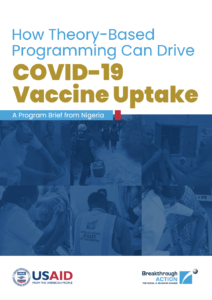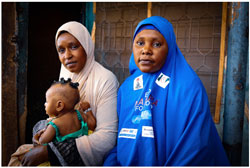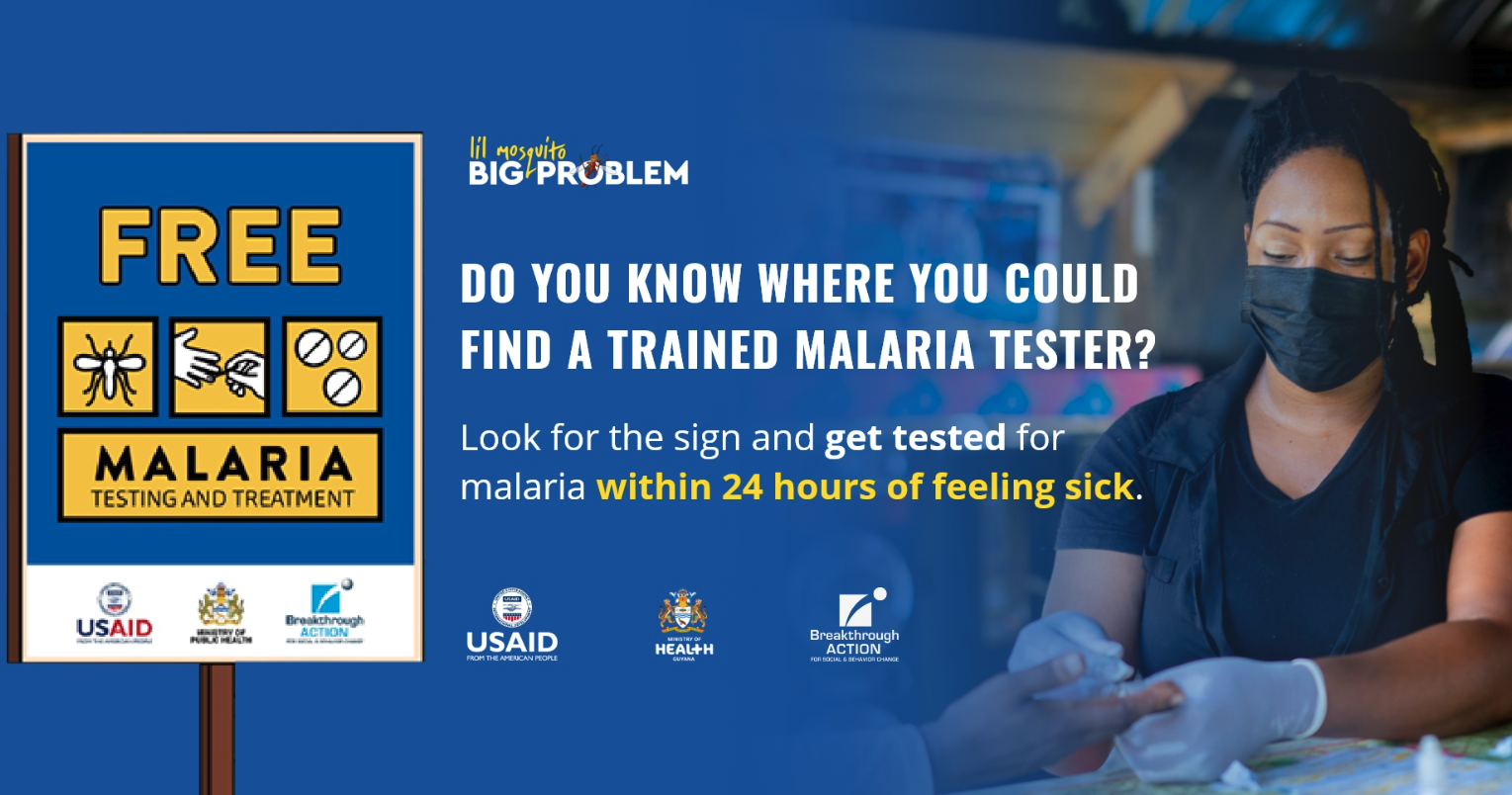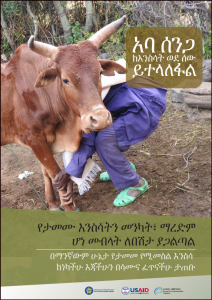Lil Mosquito, Big Problem Campaign Materials
Breakthrough ACTION is the United States Agency for International Development’s (USAID) global social and behavior change (SBC) flagship program led by Johns Hopkins Center for Communication Programs. In Guyana, Breakthrough ACTION has partnered with the Ministry of Health (MOH) to improve malaria outcomes of priority populations in the gold mining hinterland regions where malaria is endemic. The project provides SBC support to MOH’s volunteer testing program that trains stable persons in mining communities to test for uncomplicated malaria using rapid diagnostic tests (RDT) and treat positive cases. Breakthrough ACTION and the MOH used a human-centered design process to co-create solutions to improve priority behaviors together with the intended audience. The priority behaviors included:
- Individuals with signs and symptoms of malaria seek prompt and appropriate care
- Trained malaria testers appropriately test, treat, and counsel clients
- Clients adhere to malaria test results and treatment regimen
- Individuals sleep under an LLIN every night, all year round
The Lil Mosquito, Big Problem campaign is a multi-channeled, evidenced based social and behavior change campaign that targets mining communities in the malaria-endemic hinterland regions of Guyana. The campaign uses a highly visual, low literacy approach and aims to increase the proportion of the primary audience who feel at risk of malaria, test for malaria within 24 hours of experiencing symptoms, complete treatment, and sleep under a long-lasting insecticide-treated net every night.
Campaign materials include:
- Campaign theme song – ‘Big Problems Coming’ is a Soca song performed by a famous Guyanese artist.
- Music video for “Big Problems Coming”
- Radio spots: risk perception, testing, treatment adherence and LLINs
- Jungle Feevah radio serial drama
- Jungle Feevah animated video miniseries (also contains COVID-19 messaging)
- Live actor TV spots: testing and treatment, LLINs, testimonial
- Posters: testing, treatment adherence, LLINs
- Vinyl posters: testing, treatment, LLINs
- Banners: prompt care seeking*
- Brochures: English, Spanish, Portuguese
- Laminated cards/Placemats for restaurants
- Branded flash drives that integrate popular music with malaria messages by influential DJs
- DVDs with all audiovisual materials
- Social media posts
Resources:
All Resources
Lil Mosquito, Big Problem Facebook page
Music video
TV spots
Radio spots
Jungle Feevah animated video series
*Available in English, Spanish and Portuguese
In February 2023, Breakthrough ACTION and the MOH employed a second human-centered design process to further refine the LMBP campaign. New interventions included:
Miners’ Buzz: This innovative entertainment-education approach wove authentic narratives from miners about life in the mines with crucial malaria messages in one- to two-minute video segments. Breakthrough ACTION produced 20 “Gyaff from the Mines” segments, “by miners, for miners,” in which real miners spoke openly about topics ranging from their experiences with malaria to family life to encounters with wildlife. These recordings provided anecdotal and contextual information to then develop 10 “Yuh Ain’ Know” segments, in which malaria experts responded to frequently asked questions from miners and addressed misconceptions about malaria, treatment, and prevention in the mining regions. The project dubbed five of the centerpiece Miners’ Buzz segments into Spanish and Portuguese. Breakthrough ACTION disseminated Miners’ Buzz through the LMBP Facebook page, WhatsApp, and television.
Malaria Backdam Champions: The Malaria Backdam Champions intervention engaged community shopkeepers and business owners, such as barbers and restauranters,
to become points of contact for miners to access malaria information. The champions promoted prompt care-seeking behaviors and facilitated access to updated testing and treatment locations. Once champions were recruited, Breakthrough ACTION provided them with several tools to help them in their role, including a shop sticker to identify them as a champion, a tester tracker listing the names and locations of VMTs within the communities, and rapid counseling cards to address commonly asked questions about malaria. They also received a laminated card with malaria information tailored to miners and the region, and flash drives loaded with malaria audio content to be played on shop sound systems. Additionally, as a form of recognition and appreciation, the champions had the option to have their pictures taken and featured on the LMBP Facebook page.
Malaria Super Teams: This intervention recognized and incentivized the outstanding commitment of VMTs and their supervisors. Breakthrough ACTION introduced a structured reward system to bolster motivation, elevate retention rates, and amplify proficiency in essential duties. Participants would qualify to win prizes such as t-shirts, caps, umbrellas, or backpacks based on their performance.
Malaria Boss: Malaria Boss leverages a network of private drivers and transportation partners to streamline the delivery of malaria test kits, treatment, SBC materials, and reports to and from interior locations. This initiative was designed to address the logistical challenges faced by regional VCS/NMP and VMTs in remote areas where inadequate transportation services often resulted in VMTs being periodically left without essential supplies. Breakthrough ACTION recruited trusted drivers who regularly traveled between the regional capital and the backdam. The project branded the bosses’ vehicles with stickers and mirror hangers; trained them on malaria basics so that they could engage with passengers and clients around diagnosis, treatment, and prevention; and equipped them with supportive SBC materials.
Cross-Cutting SBC Materials: Breakthrough ACTION developed several supportive SBC materials that were applicable across various initiatives:
- Welcome to the Mining Regions Laminated Cards: These regionally tailored materials drew attention to the fact that miners were in a high-malaria risk area, and they used actual images of camps and miners to share essential information about malaria prevention, testing, and treatment. In addition to being distributed to Malaria Backdam Champions and Malaria Bosses, the cards were strategically placed in various locations highly trafficked by miners, including commuter boats, checkpoints, airplanes and airports, restaurants, and bars.
- Testers Tracker: Regularly updated and posted in visible locations, this paper-based template aimed to record the locations of testers throughout the region, ensuring miners knew where their closest malaria service delivery point was.
- Malaria Pocket Cards: This set of resource cards could be used by Malaria Champions, Malaria Bosses, and Malaria Super Teams to share crucial information on malaria with others.
Updated: December 22, 2024
Source: Johns Hopkins Center for Communication Programs
Date of Publication: September 26, 2022






